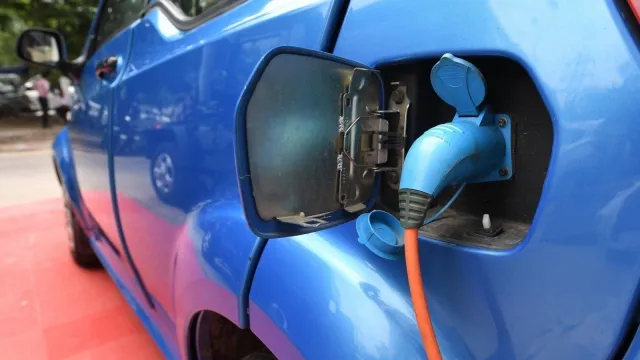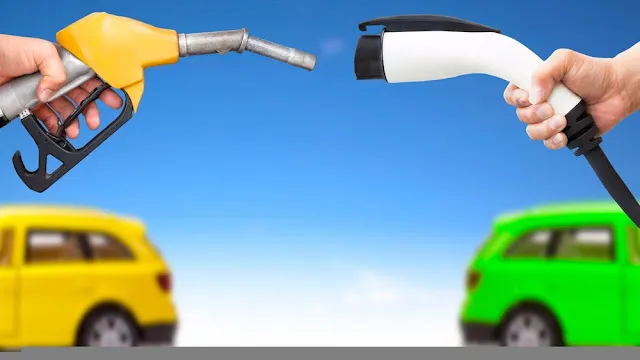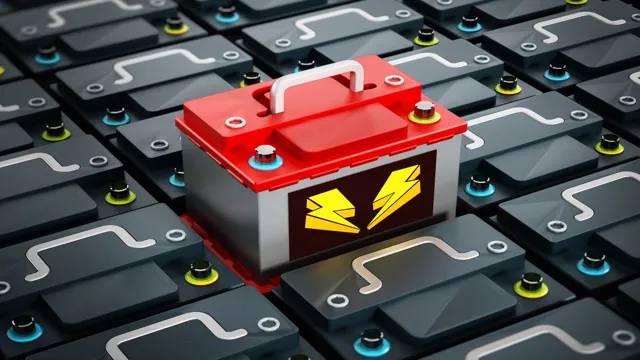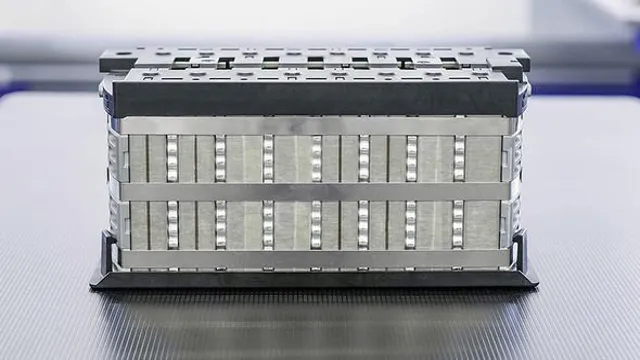Shocking Facts About Battery Waste in Electric Cars: How to Reduce Your Carbon Footprint
Electric cars have been praised for their reduced carbon footprint and potential to revolutionize transportation. While the benefits of electric vehicles are undeniable, it is important to consider their environmental impact beyond just reducing emissions. One major concern is the disposal of battery waste, which poses a threat to both the environment and human health.
Unlike standard car batteries, electric car batteries contain a significant amount of toxic chemicals, including lead, cadmium, and lithium. As these batteries age and degrade, they can leak toxic chemicals into the soil and water, contaminating natural resources and posing a risk to both plant and animal life. The risk of battery disposal is compounded by the fact that electric car batteries cannot be disposed of in traditional landfills due to their potential to release toxic fumes.
In addition to the potential harm caused by battery disposal, there is the issue of the amount of resources required to produce these batteries. The production of electric car batteries requires a significant amount of energy and raw materials, particularly precious metals like cobalt and nickel. While electric cars are often touted for their reduced carbon emissions, the mining and production of these resources can actually have a significant environmental impact, including water pollution, soil degradation, and deforestation.
The environmental impact of battery waste in electric cars highlights a need for greater consideration of the entire lifecycle of these vehicles. While electric cars offer many benefits, we must ensure that their production, use, and disposal are conducted in a way that minimizes harm to the environment. As we move towards a more sustainable future, it is important to consider the complex web of impacts that come along with our societal choices and make informed decisions that take into account a multitude of factors, including the environmental impact of battery waste.
Current State of Battery Disposal
As electric cars become more popular, the issue of battery waste has become a pressing concern. Currently, the majority of lithium-ion batteries used in these cars end up in landfills. However, this is not a sustainable solution long-term.
In fact, it poses a significant threat to the environment due to the potential leakage of harmful chemicals. That being said, there are some efforts underway to improve the situation. For example, some companies are exploring ways to repurpose lithium-ion batteries for other applications once they are no longer suitable for use in electric cars.
Additionally, there are some recycling programs in place that aim to extract valuable materials from these batteries. While progress is slowly being made, however, there is still a long way to go before battery waste from electric cars is effectively managed.
Statistics on Battery Waste Disposal
Battery waste disposal is an issue that continues to gain more attention as the use of batteries becomes more prevalent in our daily lives. According to statistics, only about 5% of batteries are properly recycled, with the majority of batteries ending up in landfills or incinerators. This presents a significant problem as batteries can contain harmful chemicals such as lead, cadmium, and mercury.
Improper disposal of batteries can lead to these harmful chemicals leaching into the soil and water, which can have negative impacts on both the environment and human health. It is important for individuals and companies to take responsibility for the proper disposal of batteries by utilizing recycling programs and ensuring that batteries are disposed of in a safe and responsible manner. By doing so, we can work towards reducing the negative impact of battery waste on our environment and promote a more sustainable future.
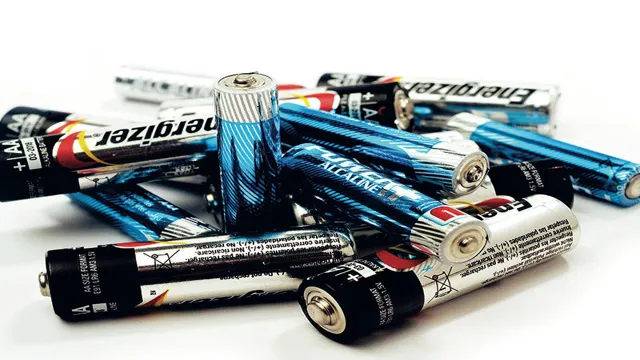
Effects of Improper Battery Disposal on the Environment
The improper disposal of batteries is one of the major contributors to environmental pollution. Currently, the situation is not good. According to reports, about 3 billion batteries are thrown away in the United States alone each year.
These batteries are typically disposed of in landfills, where they can cause significant harm to the environment. As the batteries break down, they release toxic chemicals, such as lead and cadmium. These chemicals can leach into the soil and groundwater, polluting drinking water sources and contaminating the food chain.
It is important to understand the impact of this type of pollution on the environment and how it can be mitigated by proper battery disposal. By recycling batteries, we can help reduce the amount of toxic substances that end up in landfills and prevent them from negatively impacting the environment.
Solutions for Battery Waste Management
Battery waste management is a crucial aspect of electric car ownership, and it is a growing concern for many people looking to reduce their carbon footprint. Fortunately, there are several solutions available that allow for efficient and effective battery waste disposal. One such solution is recycling, which involves breaking down the components of a battery to recover valuable materials such as cobalt, nickel, and lithium.
Another solution is repurposing, where old batteries are used for other purposes like energy storage for renewable energy systems. Battery waste can also be managed through proper disposal at authorized collection centers or by working with a reputable battery recycling company. All of these solutions can help minimize the potential hazards associated with battery waste disposal while reducing our carbon footprint.
Considering the rapid growth of the electric car industry, it’s important that we continue to explore new and innovative ways to manage battery waste and support a greener future for generations to come.
Recycling and Reusing Batteries
Recycling batteries is a crucial step towards preserving our environment and conserving energy. Batteries can be found in almost every household item, from toys to smartphones. The improper disposal of batteries can lead to hazardous chemicals seeping into the soil and endangering wildlife.
Recycling batteries not only prevents pollution, but also helps to recover valuable materials such as steel, zinc, and nickel. Additionally, reusing batteries is also an option, especially for rechargeable batteries. By reusing them, we can extend their lifespan and reduce the amount of waste we generate.
Let’s do our part in managing battery waste by recycling and reusing batteries whenever possible.
Investment in Battery Technology Research
As the world continues to embrace renewable energy sources, there has been a massive investment in battery technology research. This is aimed at creating more efficient and long-lasting batteries that can store energy from sources such as solar, wind, and hydro. However, this progress has also come with a new challenge – battery waste management.
As batteries become more prevalent, the issue of how to safely and responsibly dispose of them once they reach the end of their lifespan has arisen. There is a need to come up with solutions to ensure that these batteries are handled in an environmentally friendly way, without posing a threat to human health. One solution that has emerged is recycling.
By breaking down the components of used batteries and reusing them, we can reduce the amount of waste being produced and also recover valuable materials. This not only helps in managing battery waste but also reduces the demand for new materials, which results in a smaller environmental footprint. Therefore, it’s imperative that we invest in research and development of battery recycling technology as part of our commitment to a sustainable future.
Shift Towards a Circular Economy Model
As we continue to move towards a circular economy model, finding solutions for battery waste management has become increasingly important. Batteries are essential for our daily lives, powering everything from our smartphones to electric vehicles. However, they also pose a significant environmental threat, with the potential to leak dangerous chemicals and metals into the ground if not disposed of properly.
One solution is to recycle batteries, which can recover valuable materials such as lithium and cobalt while reducing the environmental impact of battery waste. Another option is to repurpose used batteries for secondary applications, such as providing backup power for households and businesses. By implementing these solutions, we can minimize the environmental impact of batteries and transition towards a more sustainable future.
Moving Forward with Sustainable Electric Cars
As electric cars become more mainstream, concerns have arisen about the amount of battery waste they generate. However, the good news is that many car companies are actively working to address this issue, with efforts focused on developing sustainable and recyclable batteries. One solution being explored is the development of closed-loop manufacturing, where batteries could be disassembled and then reused to create new batteries.
Additionally, there are initiatives underway to improve battery recycling infrastructure, so that fewer batteries end up in landfills. While there is still work to be done, it’s encouraging to see that manufacturers are taking steps to create a more sustainable future for electric cars. As consumers, we can also do our part by responsibly disposing of our old batteries and supporting companies that prioritize sustainability.
Together, we can move forward towards a more eco-friendly and sustainable future for electric cars.
Collaboration Between Car Manufacturers and Governments
In recent years, there has been a growing collaboration between car manufacturers and governments to promote the use of sustainable electric cars. This partnership has been instrumental in supporting the transition to environmentally-friendly vehicles and reducing carbon emissions. The government’s role is vital in setting policies and regulations that incentivize car manufacturers to invest in developing and producing affordable electric cars.
At the same time, car manufacturers are responsible for bringing electric cars to the market that meet the needs and demands of consumers. By working together, both parties can create a sustainable ecosystem that supports the growth of electric cars and benefits the environment. The keyword that best reflects this collaboration is “sustainable electric cars.
” As the world shifts towards cleaner forms of transportation, this collaboration is crucial in making this transition as smooth as possible and achieving a more sustainable future.
Consumer Education on Battery Waste Management
The rise of electric cars is an exciting development for renewable energy and eco-friendly transportation. However, as with any industry, there are sustainability challenges that need to be addressed. Battery waste management is a crucial issue that requires consumer education.
While electric car batteries have a long lifespan, eventually they will need to be disposed of. Unfortunately, many people don’t know how to properly dispose of their batteries, and some end up in landfills where they pose a risk to the environment. To move forward with sustainable electric cars, we need to ensure that consumers are educated on the importance of responsible battery disposal.
This can be accomplished through outreach programs and educational campaigns, as well as proper labeling on products. We need to ensure that consumers have the information they need to make informed decisions about how to responsibly dispose of their batteries. By working together to address this issue, we can ensure that electric cars remain a sustainable and environmentally-friendly option for transportation.
In Conclusion
In the world of electric cars, battery waste is one problem that needs to be charged up. While electric vehicles offer an eco-friendly alternative to gas-guzzling automobiles, the disposal of their batteries has raised concerns about environmental impact. However, with advancements in battery technology and recycling practices, we can recharge our efforts to create a more sustainable future.
So let’s not throw in the towel just yet, but instead spark a conversation about responsible battery management. Together, we can rev up our commitment to reduce battery waste and power a brighter tomorrow.”
FAQs
What is battery waste from electric cars?
Battery waste from electric cars refers to the disposal of batteries from electric vehicles that are no longer functional or no longer perform at an acceptable level. These batteries often contain toxic chemicals that can harm the environment if not disposed of properly.
How much battery waste do electric cars produce?
The amount of battery waste produced by electric cars depends on a number of factors, including the size of the battery, the vehicle’s driving range, and how often the battery is charged. Generally speaking, electric cars produce less battery waste than traditional gasoline-powered vehicles due to their longer lifespan and recyclability.
What are the environmental impacts of battery waste from electric cars?
The environmental impacts of battery waste from electric cars can be significant if not handled properly. Batteries often contain toxic chemicals, including lead, lithium, and cobalt, that can leach into soil and groundwater if not disposed of properly. Additionally, the production of electric car batteries requires a significant amount of energy and can result in increased greenhouse gas emissions if not produced sustainably.
What can be done to reduce battery waste from electric cars?
There are several ways to reduce battery waste from electric cars, including recycling and reusing old batteries, improving battery lifespan through better design and engineering, and investing in sustainable battery production methods. Additionally, increasing public awareness about the importance of proper battery disposal can help reduce the amount of toxic chemicals released into the environment.
